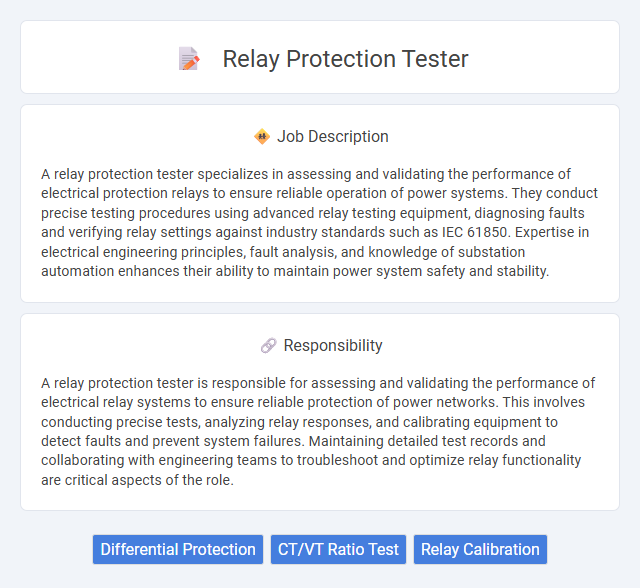
A relay protection tester specializes in assessing and validating the performance of electrical protection relays to ensure reliable operation of power systems. They conduct precise testing procedures using advanced relay testing equipment, diagnosing faults and verifying relay settings against industry standards such as IEC 61850. Expertise in electrical engineering principles, fault analysis, and knowledge of substation automation enhances their ability to maintain power system safety and stability.
Individuals who are detail-oriented and possess strong analytical skills will likely be suitable for a relay protection tester job, as the role involves precise testing and troubleshooting of electrical protection systems. Those comfortable working with complex technical equipment and following strict safety protocols might find this position aligns well with their capabilities and interests. Candidates with a propensity for problem-solving and a steady hand under pressure would probably perform best in this demanding and specialized field.
Qualification
A Relay Protection Tester must possess a strong background in electrical engineering, typically requiring a bachelor's degree in the field or a related technical discipline. Proficiency in handling relay testing equipment, understanding protection schemes, and interpreting electrical diagrams is essential for accurate fault detection and system reliability. Certification in relay protection testing and hands-on experience with industry standards like IEC and IEEE enhance a candidate's qualification and effectiveness in this role.
Responsibility
A relay protection tester is responsible for assessing and validating the performance of electrical relay systems to ensure reliable protection of power networks. This involves conducting precise tests, analyzing relay responses, and calibrating equipment to detect faults and prevent system failures. Maintaining detailed test records and collaborating with engineering teams to troubleshoot and optimize relay functionality are critical aspects of the role.
Benefit
Working as a relay protection tester likely offers the benefit of ensuring the safety and reliability of electrical power systems, which may enhance infrastructure stability. The role probably provides opportunities to develop specialized technical skills in testing and diagnosing protective relay equipment, increasing career prospects in the energy sector. High demand for qualified testers could result in competitive compensation and job security.
Challenge
Working as a relay protection tester likely involves complex problem-solving challenges due to the critical nature of ensuring electrical systems' safety and reliability. The role probably demands a deep understanding of electrical principles and the ability to troubleshoot intricate protection systems under time constraints. There may be frequent occurrences of unexpected faults requiring quick, accurate analysis to prevent system failures or outages.
Career Advancement
A career as a relay protection tester offers specialized expertise in testing and calibrating electrical protection relays essential for power system reliability and safety. Professionals in this field can progress to senior technical roles, project management, or engineering positions within utility companies and electrical firms, leveraging skills in automation, fault analysis, and system diagnostics. Continuous learning in smart grid technologies and cybersecurity enhances career advancement prospects in the rapidly evolving energy sector.
Key Terms
Differential Protection
A Relay Protection Tester specializing in Differential Protection ensures the accurate functioning of protective relays by simulating fault conditions and verifying relay responses to current differences. This role requires expertise in analyzing electrical parameters, setting relay thresholds, and troubleshooting issues in complex power systems to prevent equipment damage and power outages. Proficiency with advanced testing equipment and knowledge of IEC 60255 standards are essential for validating the integrity and reliability of differential protection schemes.
CT/VT Ratio Test
A Relay Protection Tester specializing in CT/VT Ratio Tests ensures the accurate performance of Current Transformers (CT) and Voltage Transformers (VT) by measuring their ratios and verifying the correct operation under various load conditions. This role involves calibrating relay protection systems to detect faults and prevent equipment damage in power distribution networks. Expertise in interpreting test results, diagnosing discrepancies, and maintaining industry standards for electrical safety and reliability is essential.
Relay Calibration
Relay protection tester jobs involve precise relay calibration to ensure electrical systems operate safely and reliably. Calibration requires using advanced testing equipment to measure relay parameters, identify faults, and verify protection settings against industry standards. Expertise in interpreting test results and maintaining compliance with IEC and IEEE standards is essential for optimal relay performance and system protection.
 kuljobs.com
kuljobs.com